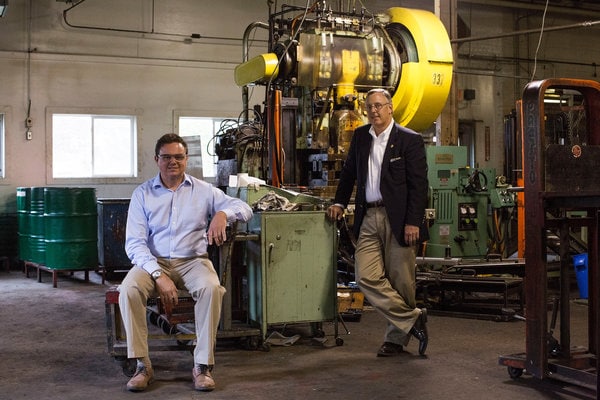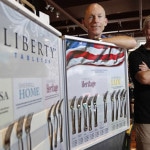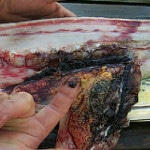Liberty Tabletop – There are many signs that the fortunes of the century-old plant, now owned by Sherrill Manufacturing, aren’t what they once were, but among the starkest are the dozens of discolored concrete patches that line a stretch of the cavernous factory floor. They mark the holes where drop hammers were ripped out and sold for scrap to keep the company in business.
“Greg would tell me, ‘We need $10,000 to make payroll,’ and I’d come out here and find $10,000 worth of machinery to scrap,” Matthew A. Roberts, the company’s president, said cheerfully on a recent walk through the plant, referring to his business partner, Gregory L. Owens, Sherrill Manufacturing’s chief executive. The pair once owned 58 drop hammers; now, they’re down to six.
Mr. Roberts doesn’t mourn the loss. Six is plenty to handle the current production needs at the plant, which is America’s last domestic flatware maker. Twenty years ago, the factory, then owned by Oneida Ltd., had more than 2,000 employees working round-the-clock, making knives, spoons, and forks by the millions. Now, just 35 people work the floor.
Having even that many is a victory to Sherrill Manufacturing. Its hometown, nicknamed “the Silver City,” was once dominated by Oneida, which had its headquarters here. Founded in 1880, the company grew to become the world’s largest flatware producer, with manufacturing plants in four countries and annual sales of more than $500 million.
But in the early 2000’s, Oneida fell into a steep, sharp decline, as the rise of low-cost Asian manufacturing eviscerated its sales. In 2004, it gave up on domestic manufacturing and announced plans to close the plant it had run in Sherrill for 125 years.
Mr. Roberts, now 51, a Sherrill native and 14-year employee of Oneida, stepped in to buy the factory and find a way to retain at least a fraction of its work force. He recruited to his cause Mr. Owens, 52, a fellow manufacturing veteran he met in Toluca, Mexico, where both did management stints at Oneida’s facility there. The day after Oneida’s Sherrill plant closed in March 2005, it reopened — with a far smaller staff — as Sherrill Manufacturing, home of Liberty Tabletop.
For 10 rocky years, the business has been groping its way toward a model that will let it operate profitably and keep at least a vestige of the town’s manufacturing heritage intact. Now, the company is starting to find some success with an approach it hopes will be sustainable: a direct-sales business aimed at customers willing to pay a bit more for American-made products.
It’s a path being pursued by a handful of American manufacturers that have tried to adapt to global economic realities by recasting themselves as high-quality purveyors of goods that preserve local production heritages. The country now has just one remaining metal whistle maker, one barber pole manufacturer, one sparkler producer and one sneaker factory, among other vanishing industries.
Domestic employment in the manufacturing industry has fallen by nearly 30 percent in the last two decades, according to government data. Around 12 million people now work in the field.
“When you lose these skills, they don’t come back,” Mr. Owens said. He’s determined to hang on to the expertise of local craftsmen like Eric Lawrence, 41, an engraver who started his career 17 years ago with Oneida. He now designs Liberty Tabletop’s patterns.
The company sells its flatware online as Liberty Tabletop, a name deliberately chosen to play up the brand’s “Made in USA” appeal. A single fork or teaspoon starts at $3.49; knives cost more than twice that, at $7.99 each. (“Knives are hard,” explained Mr. Roberts, who is happy to go into great detail about the challenges of forged blades and serrating.)
Related Article: Liberty Tabletop: Getting The Edge on China
A few big customers — most notably, the United States military — help sustain Liberty Tabletop. The federal government orders around 500,000 utensils a year for its bases around the world. Enlisted soldiers use silverware from the utilitarian Annapolis line; officers get more expensive Sheffield sets, with an ornate Old English pattern. Liberty Tabletop also does production work for Cutco, which manufactures some knives of its own in Olean, N.Y., but relies on Liberty Tabletop for the forks and spoons it resells as American-made flatware.
To run profitably, though, Sherrill Manufacturing needs to build its direct sales. The company’s owners believe that is the only model that will allow Liberty Tabletop to go up against flatware giants like Lenox and Oneida, which can produce their goods overseas for a fraction of Sherrill’s costs.
“Being a small manufacturer, we know we can’t compete head-to-head against Asia,” Mr. Owens said. “Labor, regulations, steel prices — everything gives them a cost advantage.”
There have been several near-death experiences. The company started its independent life as an exclusive manufacturer for Oneida, handling a few specialized tasks. But Oneida went bankrupt in 2006, forcing Sherrill to broaden its customer base. (Oneida was purchased by a privaty equity firm in 2011 and merged with other brands to create a new company, EveryWare Global in Lancaster, Ohio. EveryWare went bankrupt this year but emerged two months later and remains in business.) It won enough new contracts to keep operating, until the recession hit.
“The Lehman thing happened, and the world blew up,” Mr. Owens said. “We got no orders for six months, and when they started coming back, they were half the size they had been.”
In 2010, the company declared bankruptcy. Production shut down for two years as the owners worked through the reorganization process — but first, they did one last manufacturing run, to generate Liberty Tabletop’s initial inventory.
“I took all of the steel we had left, and we made our own patterns,” Mr. Roberts recalled. “We thought, ‘If we can cross this chasm, this will give us something to survive on.’” They cobbled together a website and began marketing the Liberty Tabletop brand, relying on online ads and word-of-mouth recommendations.
That first year, the online sales totaled $23,000. This year, Liberty Tabletop is on track to top $1 million.
Keeping the business running sometimes seems like tilting at windmills, the owners acknowledge, but if it disappears, they feel that something essential will be lost. America’s industrial infrastructure is a dwindling resource; to help preserve it, they source everything they can domestically. Their steel is melted in the United States and cut to size in Ohio, their polishing compounds come from Pittsburgh and Detroit, and their boxes are made by an 89-year-old, family-run paper company in Earlville, N.Y.
Related Article: Liberty Tabletop, America’s Remaining Flatware Maker, Emerges From Bankruptcy
Suppliers have a vested interest in cheering for their customers’ success, but those who work with Sherrill Manufacturing say that the company’s values-driven approach stands out. Mike Cartechine, a territory manager for H&D Steel Service, counts it as one of the few customers he does business with on handshake-deal terms.
“It’s a lot of fun to be a part of,” he said. “When my mother retired, I sent her a set of the Liberty Tabletop flatware as a gift. Every time she has a dinner party, she tells everyone, ‘My son supplied the metal for this.’”
Flatware is Sherrill Manufacturing’s focus, but every so often it takes on custom projects for other small businesses. It produces Coffee Joulies, metal capsules designed to keep hot beverages at an ideal drinking temperature; and Kleynimals, stainless steel baby toys that mimic the tactile appeal of jangly keys.
Kirsten Chapman, Kleynimals’ creator, sells about 5,000 sets a year, a production run too small for most manufacturers to bother with. For four years, she struggled with quality control and a piecemeal assembly process, until an industry contact steered her toward Sherrill. She moved her production there last year and raves about the results. The time she once spent on logistics is now devoted to developing new products.
Mr. Owens and Mr. Roberts, whose grandfather worked at the plant he now co-owns, have some nostalgia about the factory’s past: Their office’s entryway is lined with old photographs and display cabinets showing off Oneida’s historical silverware, including oddities like the avocado fork — a three-pronged device that looks more like a Klingon weapon than an eating utensil. But they are also optimistic about the opportunities for the new era of manufacturing in Sherrill. Their plant floor is filled with machines that they are eager to turn back on if demand for Liberty Tabletop’s flatware grows.
“We’re two guys who have just repeatedly failed to give up,” Mr. Roberts said.
SOURCE: New York Times
Disclaimer: Sherrill Manufacturing & Liberty Tabletops are EAGLE Members of The Made in America Movement.




